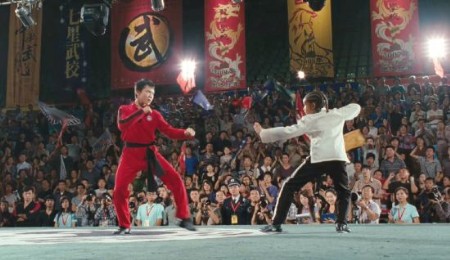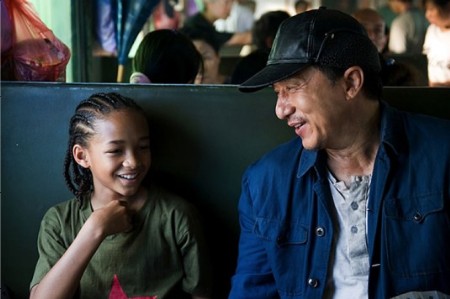Film Review: The Karate Kid — A Preteen Rumble
The remake follows the same plot as the 1984 original, but the new version is more like watching a bunch of twelve-year-old kids in a steel cage death match.

The Karate Kid remake: Are children the new American Gladiators?
Reviewed by Tom Samph
In a time when baby-faced Michael Cera and whiny John Mayer are cultural icons, Americans still can’t get enough blood and guts. It is not new that we are obsessed with violence: the novel twist is that the fixation has degenerated into watching kids take each other apart.
Case in point: this summer’s remake of the 1984 film The Karate Kid. The new version follows the same plotline as the original, but it is not really a coming-of-age story. The update comes off as an excuse to put a bunch of twelve-year-old kids in a steel cage death match.
For comparison, Ralph Macchio was 23 when the first Karate Kid came out. Jaden Smith is 12. I’m all for a good action movie, but I’d rather not watch tots beat each other up for two hours. The foley artists must have had the time of their lives cracking, whacking, and crunching objects in their sound booth to supply the effects for the hyperbolic, Mortal Kombat-like fight sequences between preteens throughout the film.
Although the movie is PG-rated, it should come with a disclaimer: if you bring children, the filmmakers are not responsible if the overstimulated minors kick each other in the face on the way out of the movie. I had to dodge a few rogue size 6 Nikes myself as I strode out of the screening.
The plot follows twelve-year-old Dre Parker (Jaden Smith), whose mother, Sherry Parker (Taraji P. Henson), is forced to move to China. A Chinese woman with a heavy accent welcomes the family to Beijing holding a sign that reads “Packer.” The family must acclimate to life in the new country, but it doesn’t seem all that difficult. During Parker’s first day in China, he manages to meet the girl of his dreams, teenage seductress and violin virtuoso, Meiying (Wenwen Han). He also encounters his arch nemesis, who happens to be Beijing’s cruelest and most malicious Kung Fu bully, Cheng (Zhenwei Wang). And later the same day, he meets his soon-to-be trainer and mentor, Mr. Han (Jackie Chan), who works as a maintenance man in the Parker family’s new apartment building.
The rest of the film follows the well-trod inspirational trail: Han helps Parker learn Kung Fu so that he can defend his honor and kick the crap out of the bad guy at the end while overcoming extreme hardship. You’ve heard it all and seen it all before.
Of course, there are some differences. Instead of, “Wax on, Wax off,” we have, “Coat on, Coat off.” Parker has a habit of dropping his coat on the floor when he gets home instead of hanging it up and is constantly berated by his mother. When he goes to Mr. Han’s house for his first Kung Fu lesson and drops his coat on the patio, Mr. Han points to a wooden peg in a post nearby and tells him to hang it up. After repeating the exercise, coat on, coat off, put it on the floor, then hang it up, countless times, Mr. Han shows Parker the results by taking a swing at him. Parker deftly avoids the attack and realizes that he has learned Kung Fu.
When I was a kid, I would have practiced putting my coat on, taking it off, and hanging it up for hours everyday if I knew I’d be picking up Kung Fu. The next scene is a long montage of training—running the Great Wall of China, dodging tennis balls, and showing Smith’s flexibility when he does a split balancing with just his feet on two railings.
Although impressive, showing off the physical prowess of a skinny twelve-year-old doesn’t translate well into a montage that’s meant to suggest a Rocky-like transformation. Maybe Smith should have downed a glass of raw eggs.
What’s more, the plot of the remake feels contrived compared to the original. The actions the characters take and the decisions they make lack rational motivation (not that there was a lot of that back in 1984). It’s as if the writers are relying on the fact that viewers already know the story, so the screenplay needn’t bother with supplying believable characters. Cheng the bully is a character like Sergeant Doakes in the Showtime series Dexter; he is angry-to-the-max, but we don’t know why.

Jaden Smith and Jackie Chan in The Karate Kid -- Kicking Their Way Through Life
The 1984 film encourages the relationship between Daniel and Mr. Migayi to develop and mature; we can see why Miyagi wants to help the kid. In the remake, the bond between Mr. Han and Parker is made haphazardly. What the plot lacks in psychological sense and story-telling depth it tries to make up for in over-the-top fight scenes. For example, when Parker tries to impress Meiying with his dance moves on a local basketball court, nemesis Cheng sees the goofy come-on and, in true thug fashion, commences to plant a foot squarely in Parker’s chest. But this is no ordinary kick—it sends the kid flying to the ground in fantasy Matrix fashion.
The remake acknowledges its roots, paying homage to the 1984 Karate Kid in a scene where Parker meets Mr. Han. Mr. Han is disturbed by a fly while eating a bowl of noodles and feigns chasing it with his chopsticks; instead, he kills it with a flyswatter, and disposes of it with the chopsticks. He then returns to eating his noodles as Parker cringes and quietly leaves.
Besides this small moment of comic relief, the movie offers little in the way of trademark Jackie Chan humor, the kind of playful, comedic fight scenes that have made him a star. What fisticuffs the film supplies are uncharacteristically brutal. The first time we see Chan let hands and feet fly in The Karate Kid is when Parker is pursued by a group of bullies. Chan swings in to defend the helpless kid and ruthlessly beats the group of preteens until they leave whimpering. It’s not a typical Jackie Chan roustabout, and the scene lasts about a minute.
As is turns out, Mr. Han isn’t much of a Jackie Chan-type character anyway. Han is consumed by a tragedy that occurred earlier in his life and lives in quiet solitude working as a repairman. We learn the reason for his seclusion late in the film, but the relationship between Mr. Han and Parker doesn’t develop enough for the audience to feel a meaningful emotional connection has been made between the two.
In the end, the showdown between Parker and Cheng takes place in a venue reminiscent of American Gladiators, an arena packed to the ceiling with cheering fans who can’t wait to see some kids unmercifully hammer each other. The fans can even watch slow motion replays of the KOs on large flat screen displays around the room. Mr. Han, Meiying, and Parker’s mother are all in attendance to watch the fights. That raises two elemental questions: whose mother would cheer from the stands as she watches her son being repeatedly punched in the face? And who in his or her right mind mistakes the pint-sized sadism of The Karate Kid for entertainment?

But the most important question: does the remake have a kid yell “get him a body bag . . . yeahhhh!” in the most annoying voice imaginable during the final fight scene? If not, I’m not going (disclaimer: I’m not going anyways).
great review!
this seems an example of hollywood’s method of remaking a movie: forget plot, characters, and relationships and concentrate on the BIG SCENES. with this movie, it’s the fights. with something like Day the Earth Stood Still, it’s the special effects.
23? wow!